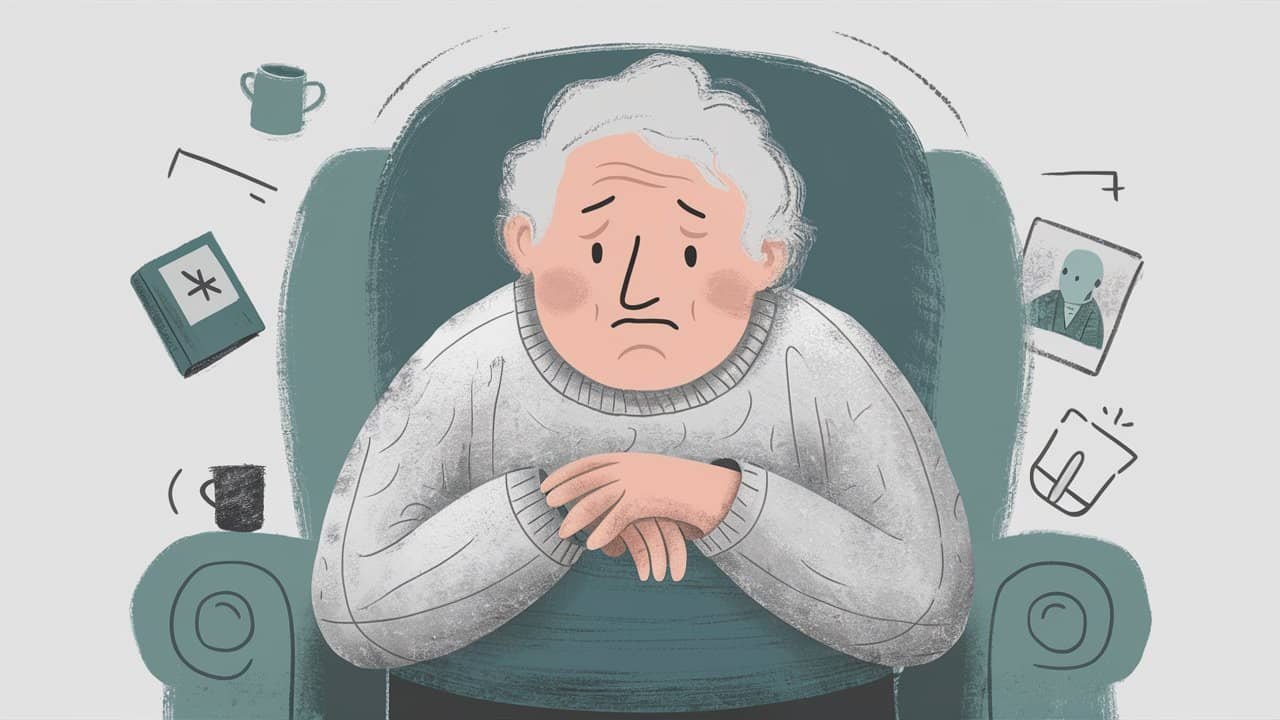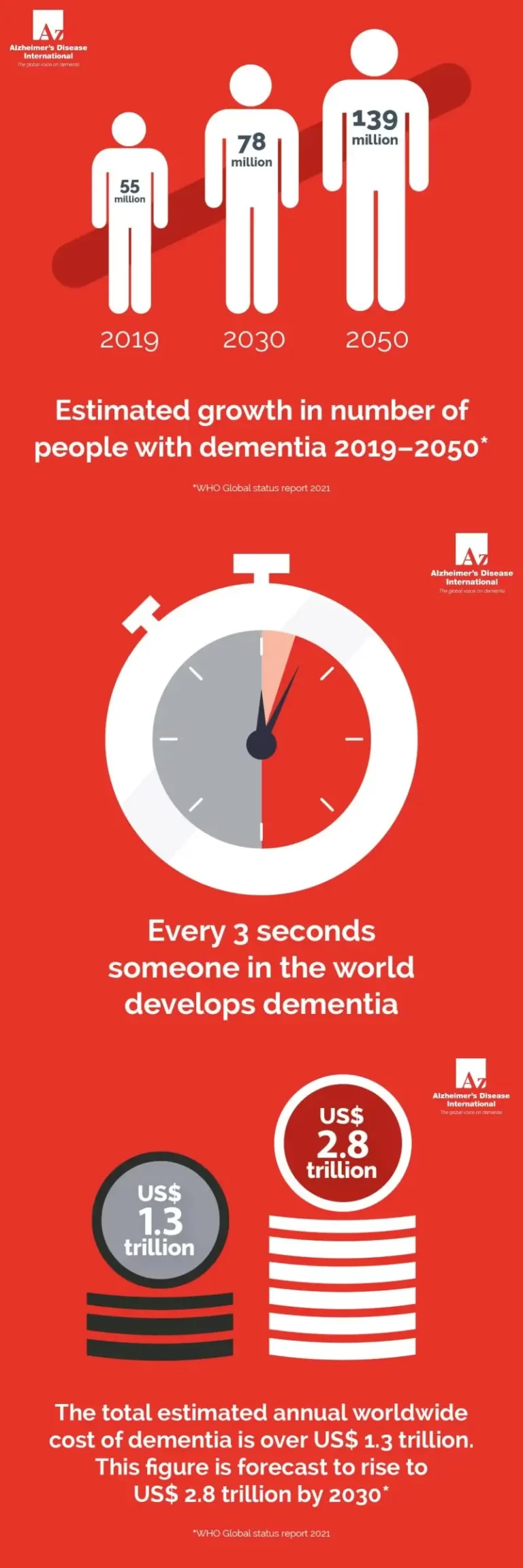12 Habits You Need To Adopt Today To Prevent Dementia and Alzheimer’s Before It Starts

You might think that getting dementia or Alzheimer’s is just part of getting older, but there are 12 habits you can start today to lower your risk and prevent dementia from ever occurring.
Simple things like eating a balanced diet and doing regular exercise are important for keeping your brain healthy.
Did you know that keeping an eye on your blood sugar and taking care of your liver are also important?
There are other lifestyle changes and even some medications that can help protect your brain.
Want to learn more about how these habits can help?
What is Dementia?
Dementia is a term used to describe a group of symptoms that seriously affect memory, thinking, and social skills, making daily life difficult.
It isn’t a specific disease but a general term for a decline in mental ability that interferes with everyday activities.
Symptoms can include memory loss, trouble communicating, confusion, changes in mood and behavior, and problems with solving everyday issues. These symptoms can differ based on the type of dementia and which parts of the brain are affected. [1]
There are different types of dementia. Alzheimer’s disease is the most common one, but there are others like vascular dementia, Lewy body dementia, frontotemporal dementia, and mixed dementia. Each type has its own traits and patterns, so getting the right diagnosis is important. [2]
Dementia happens because of damage to brain cells. [3]
This damage can come from various causes like diseases that break down brain cells, problems with blood flow to the brain, head injuries, or infections. Figuring out the exact cause often depends on the specific type of dementia. [4]
Diagnosing dementia involves a detailed medical check-up, which includes cognitive tests, brain scans, and blood tests. While most types of dementia can’t be cured, treatments focus on managing symptoms, slowing down the progress of the disease, and improving the quality of life for both people with dementia and their caregivers.
Here are some interesting statistic’s I’ve found from the Alzheimer’s Disease International website

What is Alzheimer’s Disease?
Alzheimer’s Disease on the other hand is the most common type of dementia. It causes a gradual decline in brain function, affecting memory, thinking, and behavior. [5]
This happens because of abnormal proteins like beta-amyloid plaques and tau tangles building up in the brain. These proteins make it hard for brain cells to communicate, and eventually, the brain cells die. [6]
As Alzheimer’s Disease gets worse, people have trouble doing everyday tasks. They might have problems with speaking, get confused, or have mood swings. In the end, they can no longer take care of themselves.
The exact cause of Alzheimer’s isn’t known, but it’s thought to be a mix of genes, the environment, and lifestyle factors.
There is no cure for Alzheimer’s Disease right now. As with dementia, treatments today aim to manage symptoms and help improve the quality of life for those affected. Researchers are working on ways to detect the disease early and find new treatments that target its root causes.
How To Prevent Dementia and Alzheimer’s Disease
To prevent dementia and Alzheimer’s disease, you should incorporate a mix of lifestyle habits that promote brain health. Key strategies include maintaining a healthy diet, engaging in regular physical exercise, stimulating your mind, fostering social connections, and ensuring quality sleep. The following evidence-based practices collectively help support cognitive function and reduce the risk of cognitive decline.
If you don’t want to go through the whole article, I’ve prepared this easy to consume table for your convenience that summarizes everything below.
| HABIT | HOW IT HELPS | TIPS |
|---|---|---|
| Healthy Diet | Provides nutrients for brain function | Eat fruits, veggies, whole grains, lean proteins, healthy fats |
| Physical Exercise | Increases blood flow, reduces inflammation | Include aerobic, strength, and flexibility exercises; aim for 150 mins/week |
| Mental Stimulation | Forms new brain connections | Solve puzzles, read, learn new skills |
| Social Engagement | Reduces loneliness, promotes brain connections | Talk with others, join activities, stay engaged |
| Quality Sleep | Supports memory consolidation | Aim for 7-9 hours nightly, maintain consistent sleep schedule, create a sleep-friendly environment |
| Stress Management | Lowers cortisol levels, enhances brain flexibility | Practice mindfulness, meditation, yoga, deep breathing exercises |
| Avoid Harmful Substances | Protects brain from damage | Limit alcohol, avoid smoking, manage substance abuse |
| Manage Blood Sugar | Reduces risk of diabetes-related cognitive decline | Eat balanced diet, exercise regularly, monitor blood sugar levels |
| Take care of your liver | Supports brain health, reduces plaques | Exercise, eat balanced diet, limit alcohol, get regular check-ups |
| Start Intermittent Fasting | May reduce amyloid-beta levels | Consult healthcare provider before trying IF |
| Stop Taking Antidepressants | SSRIs linked to increased dementia risk | Consider non-medication treatments for depression and anxiety |
| Start HBOT | Delivers more oxygen to the brain. | HBOT sessions are expensive, you might want to consider an mHBOT for home use. |
1. Healthy Diet
Eating a healthy diet with lots of fruits, vegetables, whole grains, lean proteins, and healthy fats can really help your brain and lower the risk of diseases like dementia and Alzheimer’s. Science shows that certain nutrients are important for keeping your brain working well.
Foods high in antioxidants, like berries and leafy greens, help fight damage to brain cells. Omega-3 fatty acids, which you get from fatty fish like salmon, help keep brain connections strong and reduce inflammation.
Vitamins B, C, D, and E are also very important for protecting your brain. B vitamins, especially B12 and folate, help lower levels of homocysteine, which is linked to memory problems. [7]
- Vitamin C, found in citrus fruits, acts as an antioxidant.
- Vitamin D, which your body makes from sunlight and some foods, is key for brain health.
- Vitamin E, found in nuts and seeds, helps protect brain cells from damage.
Whole grains give you fiber and glucose, which provide steady energy for your brain, while lean proteins give you amino acids needed for making brain chemicals. By eating these nutrient-rich foods, you can help keep your brain healthy and lower the risk of memory problems.
ℹ️ Here’s a list with 11 Best Foods For Alzheimer’s Disease Prevention Based On Research
2. Physical Exercise

Doing regular physical exercise helps improve brain function and lowers the risk of getting diseases like dementia and Alzheimer’s.
Exercise increases blood flow to the brain, making sure it gets enough oxygen and nutrients. This good circulation is important for keeping the brain healthy. It even makes you think better. [8]
Exercise also helps reduce inflammation, which is a big factor in cognitive decline.
Try to include a mix of aerobic exercise, strength training, and flexibility exercises in your routine.
- Aerobic activities like walking, running, or biking increase your heart rate and improve heart health, which helps blood flow to the brain.
- Strength training, like lifting weights, helps maintain muscle and bone strength as you get older.
- Flexibility exercises, like yoga or stretching, improve overall physical function and reduce the chance of injury.
Studies show that regular physical activity helps grow new brain cells, especially in the hippocampus, which is important for memory and learning. [9]
Aim for at least 150 minutes of moderate-intensity aerobic exercise each week, and do muscle-strengthening activities on two or more days.
3. Mental Stimulation
Keeping your brain active with things like puzzles, reading, and learning new skills can really help keep your mind sharp.
According to Alzheimer’s Society UK, people who often do mentally challenging activities are less likely to get dementia.
- For example, solving puzzles and playing games like chess can improve your problem-solving skills and memory.
- Reading books can boost your understanding and vocabulary while also working different parts of your brain.
- Learning new things, like a language or an instrument, helps your brain grow new connections, making it stronger.
The idea of cognitive reserve means that a strong network of brain connections can better handle changes linked to Alzheimer’s. In simple terms, the more you use your brain, the tougher it gets.
4. Social Engagement:
Regular social engagement can help lower your risk of developing dementia and Alzheimer’s disease by keeping your brain active and emotionally happy.
Staying in touch with others and doing activities with them can lessen feelings of isolation and loneliness, which are big risk factors for memory problems.
Talking with others, joining group activities, or going to community events gives your brain a workout that can help keep it strong.
According to an article on Psychology Today, social interactions can keep your brain flexible and resilient. Spending time with others in meaningful ways may counteract the harmful effects of stress on the brain.
People who are socially active often have better memory, better thinking skills, and a slower rate of cognitive decline compared to those who are isolated. [10]
To make the most of your efforts, try to take part in different social activities. Whether it’s joining a club, volunteering, or just keeping in touch with friends and family, these interactions are good for your emotional well-being and brain health.
5. Quality Sleep

Getting good sleep is really important for keeping your brain healthy and lowering the risk of these neuro degenerating diseases.
Studies show that enough sleep helps with memory and brain function. [11]
To get better sleep, try to sleep for 7-9 hours each night without waking up. Go to bed and wake up at the same time every day, even on weekends. This helps your body’s internal clock.
Avoid drinking coffee or smoking close to bedtime. Also, make your room dark, quiet, and cool to help you sleep better. You can also include some of these Plants that improve sleep quality. Finally, stay away from screens before bed because the blue light can mess with your sleep hormones.
For more tips on how to improve your sleep quality, check our sleep archives for more content on the importance of sleep.
6. Stress Management
Chronic stress can speed up memory and thinking problems, so it’s important to use stress-reducing techniques like mindfulness, meditation, yoga, or deep breathing exercises in your daily routine.
Studies show that long-term stress raises cortisol levels, which can harm the hippocampus, a part of the brain important for memory and learning. [12]
High cortisol is linked with brain cell damage and problems with brain connections, both needed for thinking clearly says Aaron Tribby, Physiologist at Aviv Clinics.
Doing mindfulness and meditation can lower stress by helping you relax and control your emotions better. These practices can also lower cortisol levels and help your brain by making it more flexible.
Yoga, which mixes physical movement with breathing control, can reduce stress hormones and boost overall well-being. Deep breathing exercises, like breathing from your diaphragm, activate the parasympathetic nervous system, which helps calm the body.
Also, try to laugh more. It sure “pushes” stress away.
7. Avoiding Harmful Substances
This isn’t a no-brainer – if you want to minimize the chances of getting dementia or Alzheimer’s disease it’s important to limit how much alcohol you drink, avoid smoking, and handle any substance abuse issues.
Drinking too much alcohol can harm your brain over time. Alcohol can mess up how your brain works, especially the hippocampus, which is key for making memories. [13]
Smoking on the other hand brings harmful chemicals into your body that can cause stress and inflammation in the brain. This can lead to thinking problems and brain aging faster.
Research shows that smokers are more likely to develop dementia and Alzheimer’s disease compared to non-smokers. According to Alzheimer’s Society UK, it is estimated that smoking increased the risk of developing dementia by 30-50%.
Finally, taking care of any substance abuse is also important because drugs can mess up brain chemicals and cause brain damage. Using drugs like opioids or stimulants for a long time can lead to thinking problems and a higher risk of brain diseases.
8. Manage blood sugar
Managing blood sugar levels is important for lowering the risk of cognitive decline and dementia.
High blood sugar, or hyperglycemia, can lead to diabetes, which increases the risk of both vascular and neurodegenerative types of dementia. Chronic high blood sugar damages blood vessels, reducing blood flow to the brain and causing cognitive problems. [14]
To keep your blood sugar at a good level, eat a balanced diet with lots of fiber, lean proteins, and healthy fats.
Try to limit refined sugars such as breads, pasta, pastries and ultra processed foods.
Regular physical activity is also key; exercise helps your body use insulin better and manage blood sugar. Checking your blood sugar regularly can help you catch and fix any problems early.
ℹ️ Sometimes, lifestyle changes alone aren’t enough. In those cases, doctors might prescribe medications like metformin or insulin. These medicines can help keep your blood sugar in check and prevent long-term issues.
9. Take care of your liver
Recent studies show that your liver plays a big role in the development and progression of Alzheimer’s disease. This means that keeping your liver healthy can help prevent memory problems.
Some evidence suggests that the harmful plaques found in the brains of people with Alzheimer’s might actually start in the liver. The liver helps clear these plaques from your blood. If your liver isn’t working well, it mightn’t be able to remove them, and they could end up in your brain. [15] [16]
Here’s a 4-minute video done from Dr. Eric Berg on this matter (12M subscribers)
To keep your liver healthy, try to adopt good habits. Again:
- Regular exercise can help your liver by improving blood flow and reducing fatty liver disease.
- Eating a balanced diet with lots of fruits and vegetables can help reduce stress on your liver.
- Avoid drinking too much alcohol and be careful with medicines that might harm your liver.
Dr. Berg’s Electrolyte Powder Formula
Dr. Berg’s Electrolyte Powder replenishes electrolytes and relieves muscular cramps. Dissolves easily and is ideal for promoting endurance, hydration, normal muscle function and energy. It’s also keto-friendly! Each dose includes 1000mg of potassium and absolutely no sugar, carbs, maltodextrin, or artificial additives.
10. Start intermittent Fasting
Intermittent fasting (IF) might help lower amyloid-beta (Aβ) levels, which are linked to Alzheimer’s Disease, according to five animal studies.
Two of these studies showed that IF reduced Aβ levels, suggesting it might help protect the brain. However, the other three studies found no significant changes in Aβ levels. This means more research is needed to see if IF works the same way in humans. [17]
IF involves switching between periods of eating and fasting. Some common methods are the 16/8 method, where you fast for 16 hours and eat during an 8-hour window, and the 5:2 method, where you eat normally for five days and limit calories on two non-consecutive days. These methods might help improve your overall health, which could also be good for your brain.
The idea behind IF’s effect on Aβ levels includes reducing stress on cells and helping clear out old or damaged cells. While the animal studies give us some clues, we need clinical trials to see if these benefits apply to humans.
ℹ️ If you have any health problems (diabetes, cardiovascular etc) and you’re thinking about trying IF, talk to your healthcare provider first.
11. Stop Taking Antidepressants (If you are)..
While intermittent fasting might help with brain health, it’s also important to talk about antidepressants like SSRIs and their link to dementia and Alzheimer’s disease.
SSRIs, or Selective Serotonin Reuptake Inhibitors, are often used to treat depression and anxiety. Some people even use them for treating premature ejaculation. But some studies show they could increase the risk of dementia.
One study found that older people using SSRIs had a 75% higher chance of getting dementia. Other types of antidepressants like Tricyclics and MAOIs were even riskier, with more than double the risk. This means doctors should be careful when giving these medications to older adults and think about stopping them if dementia signs appear.
Another study compared older adults with depression who used SSRIs or SNRIs to those who chose therapy. It found that the medication group had a 36% higher risk of getting dementia within two years. This risk was higher for most groups, except younger people, males, Black individuals, and those with severe depression or already existing cognitive problems.
Given these findings, it’s important to talk to your healthcare provider about other ways to treat depression and anxiety that don’t involve medication, to help reduce the risk of dementia and Alzheimer’s disease.
12. Start Hyperbaric Oxygen Therapy

Another not that popular but promising habit you can develop (if you have the money, of course) is to engage in Hyperbaric Oxygen Therapy (HBOT). HBOT involves breathing pure oxygen in a pressurized chamber, and Israeli scientists believe it could slow or even reverse Alzheimer’s disease.
Researchers from Tel Aviv University conducted a small study involving six people over 60 with mild cognitive impairment. After undergoing 60 HBOT sessions over 90 days, these individuals showed a 20% improvement in brain blood flow and a 16.5% improvement in memory abilities.
Additionally, experiments with genetically modified mice resembling Alzheimer’s disease showed that HBOT prevented the formation of toxic beta amyloid plaques in their brains and facilitated the removal of existing plaques.
Although HBOT may not cure Alzheimer’s, Professor Yuri Aseri believes it could significantly slow its progression and severity. However, large clinical trials are needed to confirm these findings.
Despite its potential, HBOT is not widely available due to its high cost. Investing in a home Hyperbaric chamber can cost anywhere from five thousand to fifteen thousand dollars.
Final Words
If you can’t incorporate all the above-mentioned habits into your daily routine, don’t get overwhelmed. Stick to the basics such as:
- Adhere to a nutritious diet.
- Engage in regular physical exercise.
- Stimulate your mind.
- Foster social connections.
- Guarantee quality sleep.
.. and you’ll do just fine.
Maintain a consistent sleep schedule, avoid caffeine and smoking before bedtime, and manage stress through mindfulness.
Additionally, control blood sugar, care for your liver, consider intermittent fasting with medical guidance, and discuss antidepressant risks with your healthcare provider.
Don’t forget to include exercising and studying health and nutrition to further enhance your overall well-being.
Prioritizing these habits can greatly reduce your risk of dementia and Alzheimer’s.
Do you have other tips you want to share.. Feel free to let us know in the comments below.

